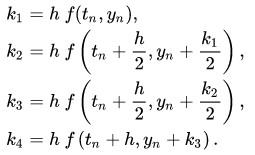As a simple exercise for a class in computational methods for physics, we've learned how to implement the RK4 (Runge-Kutta 4th-order) algorithm for a very simple exponential decay. E.g. the function y(t) is governed by

Based on the RK4 definition from most sources, and specifically in this case Wikipedia,

determining the 4 values k₁, k₂, k₃, and k₄ all depend on the function f(t,y) for different increments of t

However, since I don't know y(t) for arbitrary times (that's what the RK4 approximation is trying to calculate), I can't easily get f(t+h/2, y+k₁/2) like in the Wikipedia notation for k₂.
My question is: When the time dependence of f(t, y) is not known in an exact form, would it be possible to just use Euler’s method of approximation for f(t, y) for all of the kn values instead of just k₁?